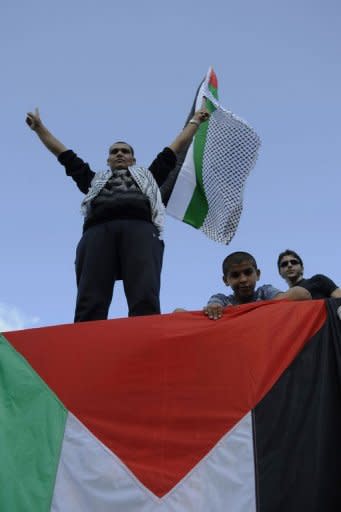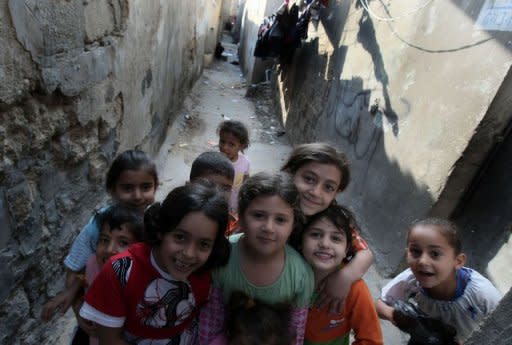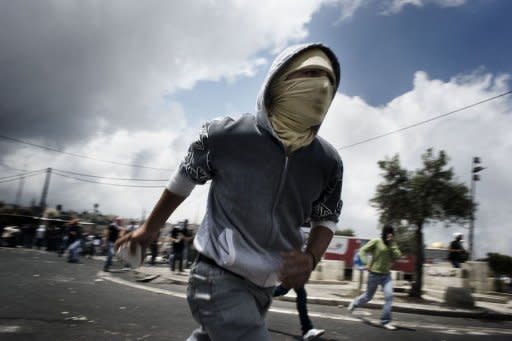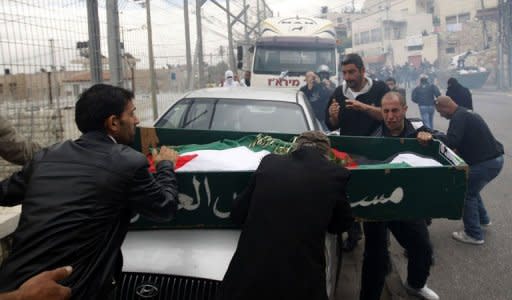Israel police stand back as Palestinian teen buried
Around 2,000 mourners laid the body of a Palestinian teenager killed in Jerusalem clashes to rest on Saturday as Israeli police kept a discreet watch but did not intervene, fearing more unrest. A military spokesman later said the army was to impose a 24-hour closedown of the West Bank from midnight (2100 GMT) on Saturday to keep Palestinians out of Israel, with exceptions to be made only for humanitarian cases and for medical treatment. Milad Said Ayyash was fatally wounded on Friday as Palestinians across annexed east Jerusalem staged protests in the run-up to Sunday's anniversary of the 1948 creation of Israel, an event known to Arabs as the "nakba" or "catastrophe. Witnesses and police said the crowd marched from Ayyash's home in the Ras el-Amud neighbourhood past a nearby Jewish settlement where Israeli security forces fired tear gas at stone-throwing youngsters in the crowd. There were no reports of injuries or arrests in the funeral procession. Carrying Palestinian flags and the banner of president Mahmud Abbas's Fatah party, the mourners, some of them masked, chanted "Allah Akbar" (God is greatest) and "With our blood and our soul, we shall sacrifice for the martyr," as they marched to the flashpoint Al-Aqsa mosque in the Old City. On arrival at the mosque, some hoisted the Palestinian flag from its roof. After prayers Ayyash was interred at a Muslim cemetery just outside the city walls, while stayed out of sight, witnesses said. "He was buried and it all ended relatively quietly," a police spokeswoman told AFP. "Our intention was to preserve general public order, not to be dragged into something or create a provocation." In conflicting reports, police said that Ayyash, whose age his family gave as 16, suffered a light wound to the shoulder from as yet unknown causes and they were investigating the circumstances. They said no live ammunition was used either by security forces or settlers. A relative told AFP that he was shot in the stomach by a Jewish settler in the flashpoint district of Silwan, where youngsters hurled stones and petrol bombs at police. News reports said petrol bombs were also thrown at a Jewish settlement enclave. Police said the family had been asked to allow a post-mortem on the youth's body but they refused and took the corpse from the hospital where he died overnight in east Jerusalem. A United Nations official said a planned visit to Silwan on Saturday by visiting Under Secretary General for Humanitarian Affairs Valerie Amos was cancelled "because of the situation." Since Friday, police have arrested 50 Palestinians on suspicion of public order offences, including 10 on Saturday, in addition to another 13 rounded up pre-emptively as potential troublemakers. Police said three officers were lightly injured in clashes with protesters who threw stones and petrol bombs and that three people causing disturbances were "very slightly hurt" by sponge rounds fired by anti-riot police. Although Ayyash's funeral was not marred by violence, clashes broke out around east Jerusalem in which young protesters stoned police and burned Israeli flags. An AFP correspondent saw at least four Palestinians hurt as police fired rubber bullets at stone-throwing youths in Silwan, with clashes also reported in Kalandia, Issawiya, Al-Tur and Ras al-Amud -- all flanking Jerusalem's Old City. Youths also threw stones at police in the Shuafat refugee camp in east Jerusalem. In Israel, a march in Jaffa, a mixed Arab-Jewish suburb of Tel Aviv, brought several hundred Arab-Israelis on to the streets, flying the Palestinian flag. Protests in Jerusalem and elsewhere are to culminate on Sunday, when Palestinian organisations have called for mass rallies, including in neighbouring Arab countries. Israeli police will remain on high alert Sunday and deploy thousands of officers around east Jerusalem and northern Israel, where the majority of its Arab population is concentrated. Seven army divisions are to be mobilised around the West Bank. In neighbouring Egypt, the army blocked access to the Sinai peninsula to prevent a planned pro-Palestinian march from Cairo to the Gaza Strip.





